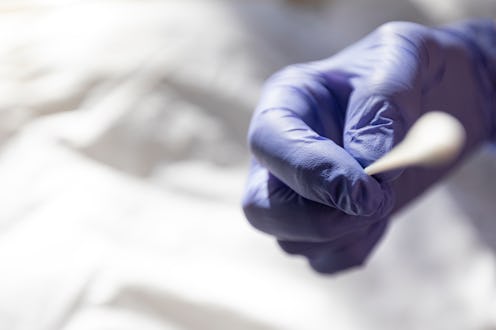Health
Could Your Gut Health Affect Your COVID Risk?
It’s another piece of the puzzle.

Over the past few years, researchers have been trying to suss out how your gut health affects the rest of your body, and have found that it can influence everything from your heart to mental health. Scientists are now turning their eye towards how your gut health impacts COVID, or vice versa.
A few small studies have suggested that there might be a relationship between the health of the gut microbiome — the population of microscopic bacteria that lives in your gut — and COVID-19 risk and recovery. A review of these studies, published in mBio in January, found that people with severe COVID-19 were more likely to have underlying medical conditions that threw out the balance of their gut microbes. While the link between pre-existing conditions and more severe COVID has been established, the information about gut health is notable because it shows how microbes can influence the body’s immune response to the virus.
“The composition and metabolism of the gut microbiome has significant effects on many host systems, including the immune system,” Dr. Liam O’Mahony M.D., professor of immunology at the Departments of Medicine and Microbiology at National University of Ireland, tells Bustle. He explains that your gut influences your immune system’s ability to deal with viruses effectively. And if your gut isn’t doing well, that could possibly affect how you deal with threats like COVID.
How COVID Affects Your Gut
More evidence shows that COVID affects your entire body, not just your lungs. Dr. O’Mahony says that the epithelial cells within your gut — its lining — can get infected with COVID, which can affect your digestion. This is why some people get digestive symptoms when they’re sick with COVID. He also notes that people with severe infection who go through a “cytokine storm,” where the immune system overreacts to COVID, might experience gut damage, which could hamper their recovery.
But when it comes to evidence of the relationship between the gut and COVID, there’s still not a lot to work with. “There are small studies, mostly from China, that have shown microbiome differences in COVID-19 patients as compared to uninfected [people],” Dr. John A. Sellick D.O., professor in the Department of Medicine at the University of Buffalo’s Jacobs School of Medicine & Biomedical Sciences, tells Bustle. “They all showed better outcomes in patients with the presence of certain bacterial species.”
What Studies About COVID & Gut Health Say
One study published in BMJ in January 2021 looked at stool samples from 27 hospitalized COVID patients, and found that the bacteria in their guts seemed to influence how severe their COVID cases were. A June 2020 study in Clinical Infectious Diseases found that microbiomes in people with COVID were different from people who didn’t have it. A third study of 15 patients in Gastroenterology discovered that people with COVID saw a lot of changes in their gut bacteria while they were hospitalized, compared to non-COVID controls. And the worse their COVID was, the more their gut microbiomes changed.
But, Dr. Sellick says, there are a lot of caveats to these studies. For one, they’re all very small. Only one excluded people who’d previously been on antibiotics, which play a big role in the diversity of your gut bacteria. And none of them sampled peoples’ gut microbiomes before they got COVID. Plus, there are millions of bacteria in your gut, and it’s not clear what role each type plays.
“The gut is home to the most intense diet-microbe-immune interactions in the body,” Dr. O’Mahony says. But the role that your gut might play in protection and recovery from COVID isn’t nailed down. A few studies have shown that probiotics and prebiotics can help prevent and treat respiratory infections, but it’s not clear if that’s the case with COVID yet. The more research there is, the closer science is to finding answers that can help COVID patients — and potentially help protect others from infection.
Experts:
Dr. Liam O’Mahony M.D.
Dr. John A. Sellick D.O.
Studies cited:
Appleton J. (2018). The Gut-Brain Axis: Influence of Microbiota on Mood and Mental Health. Integrative medicine (Encinitas, Calif.), 17(4), 28–32.
Dhar, D., & Mohanty, A. (2020). Gut microbiota and Covid-19- possible link and implications. Virus research, 285, 198018. https://doi.org/10.1016/j.virusres.2020.198018
Donati Zeppa, S., Agostini, D., Piccoli, G., Stocchi, V., & Sestili, P. (2020). Gut Microbiota Status in COVID-19: An Unrecognized Player?. Frontiers in cellular and infection microbiology, 10, 576551. https://doi.org/10.3389/fcimb.2020.576551
Gu, S., Chen, Y., Wu, Z., Chen, Y., Gao, H., Lv, L., Guo, F., Zhang, X., Luo, R., Huang, C., Lu, H., Zheng, B., Zhang, J., Yan, R., Zhang, H., Jiang, H., Xu, Q., Guo, J., Gong, Y., Tang, L., … Li, L. (2020). Alterations of the Gut Microbiota in Patients with COVID-19 or H1N1 Influenza. Clinical infectious diseases : an official publication of the Infectious Diseases Society of America, ciaa709. Advance online publication. https://doi.org/10.1093/cid/ciaa709
Kim H. S. (2021). Do an Altered Gut Microbiota and an Associated Leaky Gut Affect COVID-19 Severity?. mBio, 12(1), e03022-20. https://doi.org/10.1128/mBio.03022-20
Olaimat, A.N., Aolymat, I., Al-Holy, M. et al. The potential application of probiotics and prebiotics for the prevention and treatment of COVID-19. npj Sci Food 4, 17 (2020). https://doi.org/10.1038/s41538-020-00078-9
Onishi, J. C., Häggblom, M. M., & Shapses, S. A. (2020). Can Dietary Fatty Acids Affect the COVID-19 Infection Outcome in Vulnerable Populations?. mBio, 11(4), e01723-20. https://doi.org/10.1128/mBio.01723-20
Yeoh, Y. K., Zuo, T., Lui, G. C., Zhang, F., Liu, Q., Li, A. Y., Chung, A. C., Cheung, C. P., Tso, E. Y., Fung, K. S., Chan, V., Ling, L., Joynt, G., Hui, D. S., Chow, K. M., Ng, S., Li, T. C., Ng, R. W., Yip, T. C., Wong, G. L., … Ng, S. C. (2021). Gut microbiota composition reflects disease severity and dysfunctional immune responses in patients with COVID-19. Gut, gutjnl-2020-323020. Advance online publication. https://doi.org/10.1136/gutjnl-2020-323020